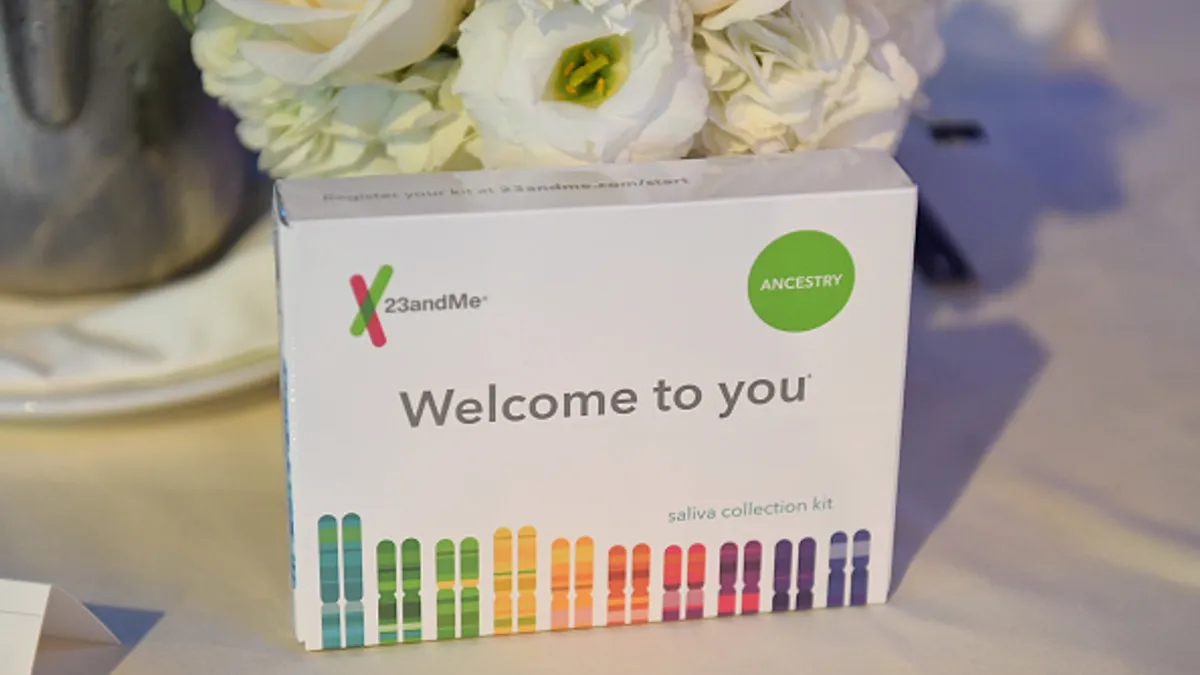Dive Brief:
- Bankrupt genetic testing company 23andMe announced Monday that it agreed to be sold to biotechnology firm Regeneron Pharmaceuticals for $256 million.
- The deal, which is subject to approval by a federal bankruptcy court, includes Regeneron’s commitment to comply with 23andMe’s data privacy policies and “process all customer personal data in accordance with the consents, privacy policies and statements, terms of service, and notices currently in effect,” according to a press release.
- “We are pleased to have reached a transaction that maximizes the value of the business and enables the mission of 23andMe to live on, while maintaining critical protections around customer privacy, choice and consent with respect to their genetic data,” 23andMe Board Chair Mark Jensen said in the release.
Dive Insight:
Sunnyvale, California-based 23andMe filed for bankruptcy in March after facing financial challenges in recent years and a massive data breach in 2023.
Federal Trade Commission Chairman Andrew Ferguson is among public officials who have expressed concern about whether data privacy commitments made by 23andMe would be kept in the event of a sale of the company and its assets.
“As you may know, 23andMe collects and holds sensitive, immutable, identifiable personal information about millions of American consumers who have used the Company’s genetic testing and telehealth services,” Ferguson said in a March letter to Acting U.S. Trustee Jerry Jensen. The information includes genetic data, biological DNA samples, health records, and ancestry and genealogy details, he said.
A spokesperson for the FTC declined to comment on the deal with Regeneron.
Under the terms of the agreement, Regeneron will acquire “substantially all of the assets” of 23andMe. The proposed sale doesn’t cover 23andMe’s Lemonaid Health subsidiary, which the company plans to wind down, the press release said.
“We believe we can help 23andMe deliver and build upon its mission to help people learn about their own DNA and how to improve their personal health, while furthering Regeneron’s efforts to improve the health and wellness of many,” George Yancopoulos, Regeneron’s president and chief scientific officer, said in the release.
The proposed transaction is expected to close in the third quarter, subject to approval by the U.S. Bankruptcy Court for the Eastern District of Missouri as well as “customary closing conditions,” including a review required by U.S. antitrust regulations, the release said. A court hearing to consider approval of the transaction is currently scheduled for June 17.
A court-appointed, independent consumer privacy ombudsman will conduct an examination of the transaction and its potential impact on consumers’ privacy, according to the release. The ombudsman is expected to present a report to the court by June 10.
The deal highlights the need for comprehensive federal data privacy protections, according to J.B. Branch, a “Big Tech accountability advocate” for Washington-based public interest group Public Citizen’s Congress Watch division.
“The precedent is being set that your DNA can be considered a business asset which is in complete contradiction to any notion of human dignity,” Branch said in an email. “Congress needs to pass real digital privacy laws that are ironclad and protect consumers from having their literal identifiable information sold off to the highest bidder.”
Without such federal protections, Regeneron's intentions to prioritize the privacy and security of consumer genetic data “still leave consumers concerned about their highly sensitive genetic data,” said Suzanne Bernstein, counsel for the Electronic Privacy Information Center, another advocacy group.
“23andMe consumers could not have envisioned, or meaningfully consented to their genetic data being sold or used for purposes outside of the original context to discover family heritage or genealogy,” Bernstein said in an email.















